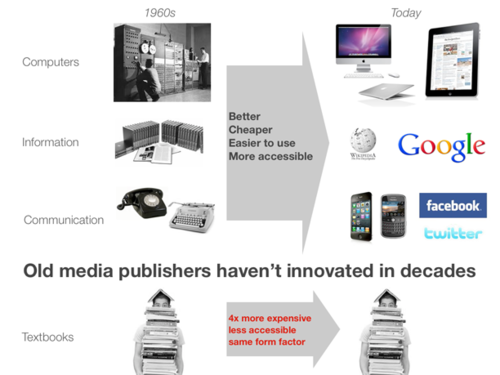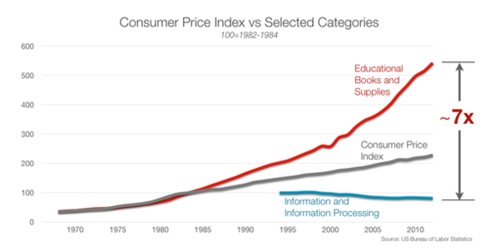$8M in Funding and a Lawsuit to Boot? Game on.
Nearly a year to the day we began, we’re ready to tell the story of one of the most broken yet important areas of education.
It’s been a hell of a year for Boundless Learning. We’ve raised $8 million in new funding, reached thousands of students with our products and innovated in an industry that’s long overdue for disruption.
But whenever there’s a great party, there are bound to be crashers.
In late March, we were sued by 3 of the world’s largest publishing companies for alleged copyright infringement.Don’t worry—we won’t let the fact that someone slipped a lawsuit in the punchbowl ruin our good time (we have a lot more punch).
Boundless is committed to bringing educational content into the 21st century, and we remain focused on our mission.
—-
Introducing Boundless
We’ve been plugging away in our bunker in Boston for the last year building products that reinvent the way that students engage with educational content.
Today, we’re thrilled to emerge and announce that we’ve recently raised an $8 Million Series A round of funding led by Venrock with follow on investments from Kepha Partners, Founder Collective and Nextview Ventures.
We’re very proud to be working with such an esteemed group of investors, and this new round will be critical in helping us realize our goal of giving students educational products that are actually built with them in mind. We’re also working with an incredible group of advisors with deep experience in education, publishing and the OER community.
A Broken Market with Little Innovation
Of all of the pieces of the learning equation, the one most ripe for disruption is the educational content industry. Textbooks remain the core content for most courses in higher education, yet they’re completely obsolete: expensive, disconnected relics of an analog age.
According to The College Board, the average college student spends over $1,000 per year on textbooks. At community colleges, the cost of textbooks alone can often exceed 50% of a student’s overall educational expenses.
Is it any wonder that 7 in 10 college students have skipped buying a required text due to price concerns?
There’s one other major concern: textbooks are just flat-out terrible products. They’re ineffective pedagogical tools: dense collections of long-form text that fail to engage students’ wide range of learning styles.
Everyone has a favorite teacher, but no one has a favorite textbook.
Technology has improved quality and reduced the costs of production and distribution in almost every other content-centered industry. How have the textbook publishers managed to maintain their antiquated business model for so long?
Textbook Publishers: A History of Exploiting Students
The textbook publishing market is an oligopoly, with over 80% of the textbook market controlled by the top 4 publishers: Pearson, Cengage, Wiley and McGraw-Hill.
These publishers have been able to maintain nearly 65% gross margins on what is essentially a commodity product. They have continued to raise prices for this stagnant product in the face of innovation in every other information related industry, growing at a rate of 3 times inflation.
Additionally, these publishers have maintained their grip on the industry with questionable sales tactics and anti-competitive actions. In fact, these abusive tactics are so egregious that it forced Congress and the President to intervene.
In 2008, President Obama signed the Higher Education Opportunity Act (HEOA) into law to increase transparency in education and help students navigate the costs associated with pursuing a degree. The HEOA requires, among other things, that textbook publishers “unbundle” their core educational content from optional add-ons like study guides or homework systems.
Unfortunately, many publishers have failed to comply with HEOA’s demands. These publishers continue to package their content with expensive access codes to “homework systems”—glorified online quizzes that often charge students up to $90 just to submit their required classwork.
Stifling Innovation to Protect an Outdated Business Model
These publishers’ antiquated business models and fat margins are being threatened from all directions, and we’re the ones that caught their eye.
On March 23, we received word that we’ve been sued for alleged copyright infringement by Pearson Education, Cengage Learning and Bedford, Freeman & Worth.
Change is hard, particularly when it’s disruptive.
It’s disappointing that these companies chose to open communication with us via litigation. We’re currently preparing our full response, and we believe that the allegations in this lawsuit are without merit and we will defend our company and mission vigorously.
These publishers are threatened by innovation and have responded by wrongfully claiming ownership of open knowledge and information. We respect the legitimate intellectual property rights of others, but facts, ideas, and other not newly created material are not protected by copyright and cannot be owned by anyone.
Francis Gurry, Director General of the World Intellectual Property Organization, has rightly argued that successful copyright policy has to be based on neutrality and should not “preserve business models established under obsolete or moribund technologies.”
Like the major players in the music industry 10 years ago, textbook publishers are now faced with fighting a battle that they’re doomed to lose: asking consumers to continue to foot the bill for an overpriced, lackluster content experience.
Seeking a Solution
In higher education, students are the ones who ultimately bear the cost of textbooks, as professors decide which text is required for their course. Professors have no real incentive to find the most affordable solution for their students. Likewise, given that they’re essentially selling to a captive audience, there’s no pressure for publishers to cut costs.
Every semester, students face the same frustrations—hunting for “custom” editions that are exactly the same as the original text and coughing up hundreds of dollars for “new” editions that offer little significant change from their predecessors.
Outside companies have worked to develop more beautiful and engaging digital textbooks—see Inkling, Apple and Kno—but their offerings are stifled by DRM and availability issues.
Publishers “digital’ offerings are no more exciting. Most digital textbooks published today are little more than glorified PDFs, scanned versions of print content with no innovation or attempts to improve the content consumption experience.
In short, these products are failing because they are not focused on the primary consumer: the student.
Boundless: Building a Better Solution
Students are angry, and they’re ready for change.
At Boundless, we realized that the sad state of the textbook industry is especially startling when you consider the wealth of Open Educational Resources (OER) that has been created over the last 20 years by leading educators and institutions. Top tier universities, professors, and faculty have created amazing educational content, which has remained disconnected from existing students—until now.
Boundless’ first beta offering was a 100%-free textbook replacement that leveraged these open resources to prevent students from being forced to shell out hundreds of dollars on their assigned texts.
Boundless textbook alternatives enabled students to access relevant course content anywhere, take notes and highlights and focus on key terms and concepts.
This initial product was just the first step toward our goal of making the world’s open knowledge free, open and accessible.
Students Are Loving Boundless
Since launching our private beta in the fall of 2011, we’ve reached thousands of students at over 1,000 universities across the country.
On average, students who used Boundless throughout the fall semester rated the experience 50% better than a physical textbook.
The average grade received was a B+, with 80% of our users reporting that they received the grade they wanted or higher.
As a result, 92% of users reported recommending Boundless to a friend.
Looking Ahead
The last year has been an incredible learning experience for the Boundless team. Our most important lessons have come from working directly with students to help hone our core product into an indispensable educational tool.
We have been working towards a new iteration of our core product that makes it easier still for students to consume educational content, gain real-time feedback and master the relevant content for their courses.
It seems obvious now, but that’s hindsight for you. The product that is going to replace textbooks isn’t going to look anything like a traditional text.
We remain focused on building a content platform that integrates students’ course content across disciplines and offers unparalleled accessibility, affordability and academic effectiveness.
We will not let the recent litigation distract us from our mission, and can’t wait to show you what we’ve been working on—we’ll be releasing our new offering soon.
Sign up today to get early access to our next release.
Ariel Diaz
CEO
Boundless Learning


